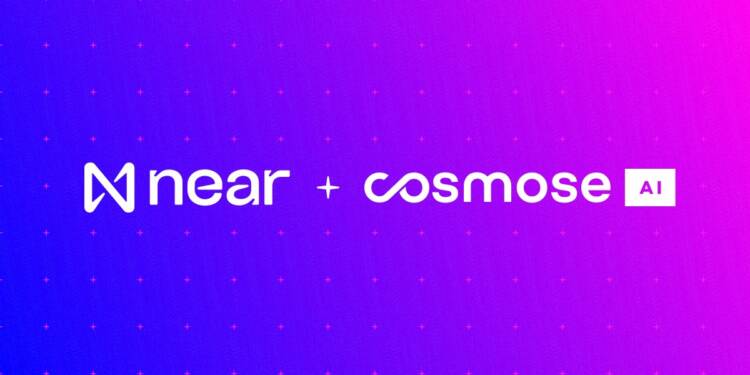The retail industry is no stranger to technological advancements. Over the years, it has embraced e-commerce, augmented reality, and digital marketing, to name a few. Now, two groundbreaking technologies, Artificial Intelligence (AI) and Web3, are converging to spark a revolution in retail that promises to transform customer experiences without compromising privacy and security. As one of the frontrunners in AI-driven retail innovation, Cosmose AI has recently attracted a strategic partnership from the NEAR Foundation to further drive its retail sector.
Cosmose AI Meets NEAR Foundation’s Web3 Expertise
Cosmose AI, a company established nine years ago, harnesses AI analytics to monitor in-store foot traffic and interact with consumers online. It is now collaborating with Near, a blockchain protocol that rivals Ethereum. Together, they are developing a payment system that enables users to make purchases using cryptocurrency at reduced transaction fees, resulting in cost savings for both buyers and merchants.
Leveraging the NEAR Blockchain Operating System (BOS) and AI-driven retail personalization, Cosmose empowers users with access to their data and tailored suggestions. This shift towards a decentralized, user-centric Web3 future highlights the potential of AI and blockchain to revolutionize existing business frameworks in the retail industry.
By harnessing NEAR’s technology and ecosystem, Cosmose can transform traditional retail business models and create ultra-personalized shopping experiences that foster loyalty and satisfaction. These experiences will encompass its flagship mobile app, KaiKai, and a range of AI-based personalization tools.
In collaboration with the partnership, the Near Foundation, a non-profit entity supporting the development of the NEAR protocol’s ecosystem, has made a strategic investment in Cosmose. Though the investment amount remains undisclosed, this funding round elevates the company’s valuation to $500 million, a significant increase from its $100 million valuation after securing $15 million in Series A financing back in 2020.
Kai-Ching Lowers Transaction Fee
KaiKai, the flagship product of Cosmose AI, ingeniously combines shopping, retail, and gamification to establish an entirely new category: Shoppertainment. This innovative mobile shopping experience is built using the BOS as its backbone, enhancing brand discovery and engagement by making the process more enjoyable and rewarding for users.
Miron Mironiuk, founder and CEO of Cosmose, said, “NEAR is the most secure, scalable, and sustainable blockchain protocol. As such, we’re grateful for the ongoing support from NEAR Foundation and are excited about what’s to come.”
Leveraging NEAR, Cosmose empowers retailers to foster more robust customer connections while simultaneously tackling privacy and data security concerns inherent in traditional Web2 retail data collection methods. Cosmose and its innovative KaiKai mobile app have gained the trust of leading brands such as LVMH, Richemont, L’Oréal, and Estée Lauder.
Mironiuk added, “Having built on NEAR in 2022 and while working with NEAR Foundation, we discovered that our visions for the Web3-driven future are aligned.”
KaiKai also incorporates a native cryptocurrency called Kai-Ching, functioning similarly to traditional retail rewards programs. However, Cosmose’s AI offers more recommendations and reward suggestions, allowing customers to conveniently conduct transactions on the NEAR blockchain using a dedicated KaiKai crypto wallet.
Marieke Flament, CEO of the Near Foundation, said, “We’re excited to support Cosmose as it continues to scale rapidly and create new ways for retailers to offer customers the best offline and online shopping experiences. Cosmose has already been building on NEAR testnet, and with this additional support, it will have many more opportunities to grow and expand its offerings with Web3 in a sustainable, transparent, and infinitely scalable way.”
In essence, NEAR is assisting Cosmose in transferring user data onto its blockchain and developing a system that allows users to view the tracking information, including their location, app usage, browsed products, and duration of the engagement.
The objective is to store user data on their devices through edge computing and empower individuals to choose their preferred tracking levels, ultimately receiving more or fewer product recommendations and rewards based on their preferences.























